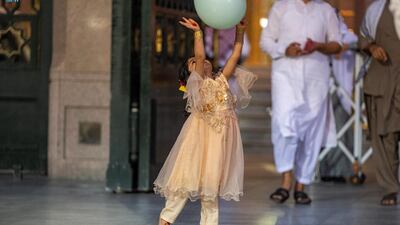Read the latest updates on the Hajj pilgrimage here
Pilgrims celebrated on the third day of the annual Hajj pilgrimage that began on Monday.
An enormous number of pilgrims traversed the holy sites in the last few days and have now completed most of their Hajj rituals.
"We are very lucky to be here, we feel like the chosen ones," said Saima Khan, from the UAE.
"It is hard and exhausting, but rewarding in the end. Today we just celebrated Eid with the women in our tent, and we are just resting it out," she added.
"We wished each other Eid Mubarak, wore new clothes in light colours – we are all wearing pastels, colours of the summer."
Last year, Saudi authorities allowed one million pilgrims to participate in Hajj. This year, the number exceeded 1.8 million.

"We did our official sacrifice early this morning. We are just happy to have accomplished our rites and to be resting in our air-conditioned tents," Ms Khan said.
Pilgrims who had performed Hajj before have said they are "very impressed" with the positive development of Hajj and the kingdom's security services and volunteers.
"When I compare today's Hajj, it is very different. We didn't have air conditioners, coolers or such tents before," India's former Hajj Committee chairman Salamat Ullah said.
"There are so many trees now! The health measures and staff are so good, the guards and police forces are commendable," he added.
"I am doing Hajj (again) after 15 years, there is a huge difference in the way Hajj authorities have developed the sites", Egyptian pilgrim Nada Youssef said.
"Most of all I am impressed by the security services here who are managing the large numbers.
"The soldiers were very helpful and very kind. They sprayed us with water all the time wearing a smile on their face," she added.
"Every group had its own time to use the train to be transported from one place to the other, which was a blessing," Dr Hadir Eldessouky, an Egyptian pilgrim who lives in Jeddah, said.
'Exhausted but overjoyed'
Pilgrims made their way from Muzdalifah to Jamarat in the early hours of Wednesday to complete the 'stoning of the devil' ritual.
"Jamarat was very well organized and smoothly going," Dr Eldessouky said.
"Though we lacked water a bit and we walked a long way, there were cold water tanks in the alley."
Jamarat is a three-pillar structure that symbolises the devil.
Saudi authorities have created an easier path to reach the structure in order to avoid overcrowding, stampeding and pilgrims getting hurt in the process.
"We collected a handful of pebbles and brought them with us to Jamarat, and once we finished stoning the devil we retired to our rooms," Aisha, a Pakistani pilgrim, said.
"We had mixed emotions, we were exhausted from the long journey but overjoyed that we had been able to complete the rituals of Hajj", she added, remarking that the ritual had been well organised.
"We just went to the first floor, did the stoning and moved on to make way for the next group of pilgrims," she said.
"There were wheelchairs and volunteers who took one sick lady all the way from the entrance to the finish."
Pilgrims will get a chance to rest in Mina on Wednesday after the stoning ritual.
"We are in Mina; our experience has been great in regards of our communication with guides and administrators, and we are given timely updates and procedures", said Nuvera, a Pakistani pilgrim, part of a group that brings UK- and US-based Pakistanis to Hajj every year.
Hajj pilgrims will need to perform one last circumambulation around the Kaaba, the Tawaf Al Ifadah, before they return to their home countries.
However, many pilgrims will choose to continue their journey after their pilgrimage and stay in Madinah, the site of the Prophet Mohammed's tomb.









